

Vibrant Communities
Meet Nohely
Velazquez, administrative services directorWalk into a Comprehensive Healthcare location, and the first people you see – our front desk staff – are led by Nohely Velazquez, administrative services director. Nohely has spent her three years with the agency bringing our support staff under one umbrella, implementing consistent processes, and training and coaching her staff to more fully serve our clients with a deep knowledge of our programs, services and processes.

Her oversight is immensely important, especially as we’ve introduced same-day access at all our locations. Clients can now walk into any of our campuses Monday through Friday from 7:30 a.m. to 3 p.m. to be seen the same day for their intake appointment. Nohely, along with other members of our Rapid Cycle Change Team, worked together for a full year to make the initiative a success.
“It’s been exciting to be part of same-day access – we’re all proud of this. Intake appointments that used to take up to three months are now available the same day,” Nohely said. “Our clients can access treatment quickly, which is our desired outcome.”
Meet Natalie McGillen,
senior director
Natalie McGillen, Senior Director at Comprehensive Healthcare, leads the agency’s Certified Community Behavioral Health Clinic (CCBHC) initiatives with passion and dedication. Since joining the agency in August 2021, she has spearheaded efforts to expand access to mental health and substance use disorder (SUD) services, securing and managing two $4 million CCBHC grants.
“My thought every single morning when I get up is how do I best serve?” Natalie shares. “The CCBHC model of care is the first model I’ve seen that really looks at how we can make things person-centered.”
Natalie works to ensure that Comprehensive Healthcare’s services align with the CCBHC model’s core principles. “It’s about whole-person care,” Natalie emphasizes. “So how do we keep individuals in community? We’re looking at things such as access and services. How do we get access to people quickly and efficiently? How do we look at recovery approaches? And it’s not always just for mental health or SUD, but also physical health. It’s all aspects of their life.”
Reflecting on her journey here, Natalie takes pride in fostering agencywide engagement with the CCBHC vision, emphasizing that it has become the collective vision of the entire organization. As the agency progresses toward CCBHC certification, Natalie remains at the helm, embodying the agency’s dedication to compassionate care.
It’s nearly impossible to imagine what our impact would look like without the essential partnerships we’ve developed over the last 50-plus years. Together with local first responders, hospitals, schools, jails, and other essential groups, we’ve created remarkable synergies throughout our region. By serving on task forces, innovating new solutions for diverse community members, and collaborating with local leaders, we’re better able to meet the multifaceted needs of those we serve – supporting whole-person health together to create Vibrant Communities.
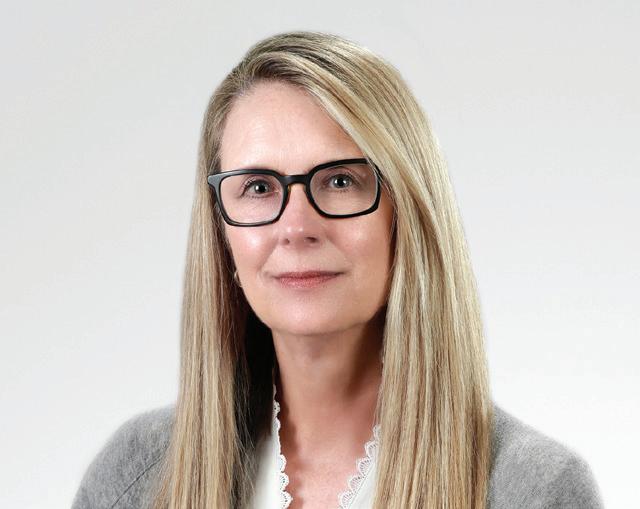
Community Partnerships Are Key to Our Vibrant Community
This spring edition of Vibrant Communities magazine celebrates the spirit of partnership, and highlights access points for community members to benefit from our collaborations (pages 4-5 and 8-9). We’re also reflecting on a highly productive and impactful 2023 with our annual report (pages 6-7) and kicking off a busy 2024 with announcements about several new initiatives and grants to expand and make our services more accessible (page 10).
Throughout, we’re proud to highlight our Comprehensive Healthcare employees, who are the backbone of our organization and enjoy long, stable careers where they can truly make a difference in the Greater Columbia Region. We’ve included a QR code on the back page so you can easily connect with our human resources department, learn about our extensive benefits and see if one of our open positions is a good fit for you.
Community behavioral healthcare is essential to the health and economic vitality of our region. Together with our partners and state lawmakers, we’re paving the way towards quality behavioral health and substance use disorder (SUD) services that are accessible to everyone who needs them.
 Jodi Daly, Ph.D. President and CEO, Comprehensive Healthcare Member of Fourfront Contributor
Jodi Daly, Ph.D. President and CEO, Comprehensive Healthcare Member of Fourfront Contributor
Together with local first responders, hospitals, schools, jails, and other essential groups, we’ve created remarkable synergies throughout our region.
Fostering Strong Partnerships
Our community partnerships are essential to our ability to offer “comprehensive” services to people in all stages of life.
By collaborating with others, we can reach clients where they are – in rural and populated communities, near home or work, at school, in a correctional facility, living in encampments, or being treated by first responders.
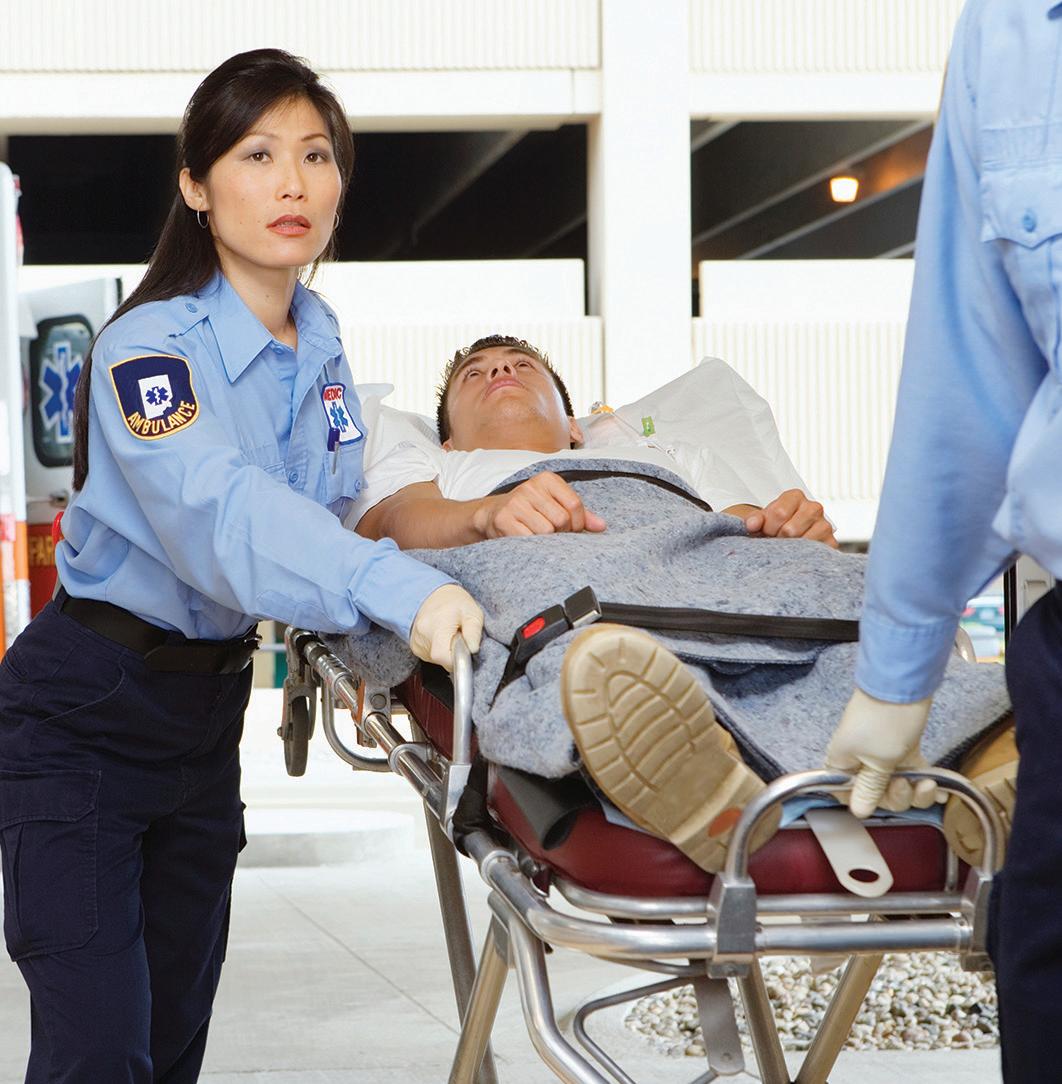

First Responders and Hospitals
Our partnerships with law enforcement agencies, fire departments, emergency medical services, and hospitals enable us to come together, work towards common goals, brainstorm solutions, and apply interventions for the safety of individuals and our community. We like to think of first responders, hospitals and behavioral health as a trio working in unison.
For example, we have specific Designated Crisis Responders (DCRs) embedded in the Yakima Police Department, and the Yakima County Sheriff’s Office. The DCRs –mental health professionals trained to engage, assess and help individuals experiencing mental health crises – ride along with law enforcement officers and serve as primary points of contact to help de-escalate situations and link community members with the care they need.
“DCRs enable law enforcement to go beyond their traditional roles in the community and bring in mental health resources that an officer simply cannot provide,” said Yakima County Sheriff, Robert Udell.
In an emergency, having a mental health professional on-site to approach someone experiencing a mental health crisis helps to stabilize the situation and support positive outcomes. Plus, working closely together leads to hands-on learning and sharing information. First responders learn strategies to connect with individuals experiencing behavioral health needs, and our mental health professionals keep a strong pulse on what is happening in the community.
We like to think of first responders, hospitals and behavioral health as a trio working in unison.
Schools
An increasing number of students everywhere are experiencing depression, anxiety, behavioral problems, not showing up for school, or are suicidal. If this sounds like a young person you know, Comprehensive Healthcare is working to help. Through partnerships with schools from Kittitas to Benton-Franklin Counties, we embed therapists on-site so that they can work directly with students, families and educators to better address behavioral health challenges as they arise. These services are open to K-12 students who qualify for Medicaid, and in some cases, free to students and their families, teachers and staff regardless of insurance or their ability to pay.
...we reduce barriers to care such as transportation, stigma and cultural norms that make it hard for people to seek care.
Treatment usually starts with a referral from a school counselor or social worker. Then, we work closely with students and family members, if appropriate, to help. This may involve improving their communication skills with their parents, helping them to better understand their own feelings, teaching positive parenting skills, and learning radical acceptance.
By offering services within the schools, we reduce barriers to care such as transportation, stigma and cultural norms that make it hard for people to seek care.
Our therapists check in with students during their school day so that working parents don’t have to take students to after-school appointments.
“If we weren’t in the schools, we would have more problems that weren’t being addressed, such as teen suicides,” said Leticia Chavez, a supervisor at our Sunnyside office and a 21-year veteran of Comprehensive Healthcare. “When a child needs help because they’re struggling with stressors at school or home, they may think that suicide is their only way out. When we can intervene at school and show them that there are other ways to solve their problems, then they can change their outlook and feel better about life.”
School partnerships available at:
• Ellensburg School District
• Kittitas School District
• Dammon School District
• Thorp School District
• Cle Elum/Roslyn School District
• Easton School District
• Sunnyside High School #201
• Walla Walla School District
• College Place School District
• Touchet School District
• Dixie School District
• Prescott School District
Many people experiencing severe behavioral health challenges or crises seek help by going to the emergency room (ER). So, our crisis team works closely with the medical staff to problem-solve, address concerns in real-time, and connect behavioral health patients to facilities or programs designed to address their needs. In the process, we help them move on from the ER, which also helps to ensure that there are beds available for medical patients when needed.

Camp Hope
Our partnership with Camp Hope, a low-barrier emergency homeless encampment in Yakima, illustrates our mission to meet people where they are, as we provide a first-of-its-kind solution in our region.
Comprehensive Healthcare is building an on-site behavioral health center to treat clients who live at Camp Hope and experience complex behavioral health and substance abuse challenges. Our staff will provide therapy, outpatient behavioral health services, and coordinate healthcare needs to support residents where they live – so that they don’t have to leave the campus to seek care. In doing so, we will decrease barriers and provide equitable access to behavioral healthcare for the region’s most vulnerable populations.
“This partnership is a game changer for those facing homelessness; and it’s something that hasn’t been done before,” said Mike Kay, executive director of Camp Hope. “When we can work together to help community members, the possibilities go well-beyond what one organization can do alone.”
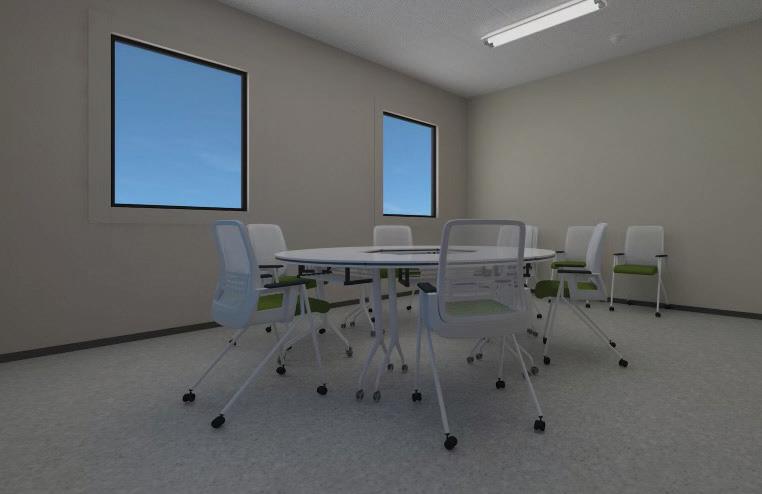

Correctional Facilities
Comprehensive Healthcare partners with the Yakima County Department of Corrections and the Benton County Jail by collaborating closely with custody staff to ensure adequate care for inmates who have mental health and substance use disorder (SUD) symptoms. Correctional and behavioral health team members have built close working relationships as trusted experts – which helps drive better outcomes for inmates.
“These partnerships allow us to expand our reach with clients, implement new programs or enhance old ones and ultimately provide better services to our clients,” said Whitney Gregory, program manager at the Yakima County Department of Corrections.
In addition to having mental health and SUD professionals on-site and on-hand to help when crises or challenging situations arise, we’ve built proactive programs to support wellness, including targeted behavioral health units in the jail, client engagement groups, and new medication for opioid use disorder (MOUD) programs. None of these programs would be possible without the jails’ commitment to working with Comprehensive Healthcare to support services for this population.
Central Washington Fentanyl Task Force
Our Chief Medical Officer, Dr. Frank Garner, sits on the Central Washington Fentanyl Task Force along with Comprehensive Healthcare board members Megan Tweedy, an activist preventing death by fentanyl overdose; Yakima County Sheriff Robert Udell, and State Rep. Gina Mosbrucker. In May 2023, U.S. Rep. Dan Newhouse launched the task force to address the spectrum of issues tied to the fentanyl crisis – focusing on enforcement, education, prevention, and treatment.
Including treatment providers on the task force helps to interpret data and ensures that policies are attuned to the epidemic’s human side.
“Having our voices at the table is critical to share our knowledge with key federal decision-makers, such as Congressman Newhouse, so that they hear from community behavioral health experts in Central Washington doing the work,” Tweedy said.
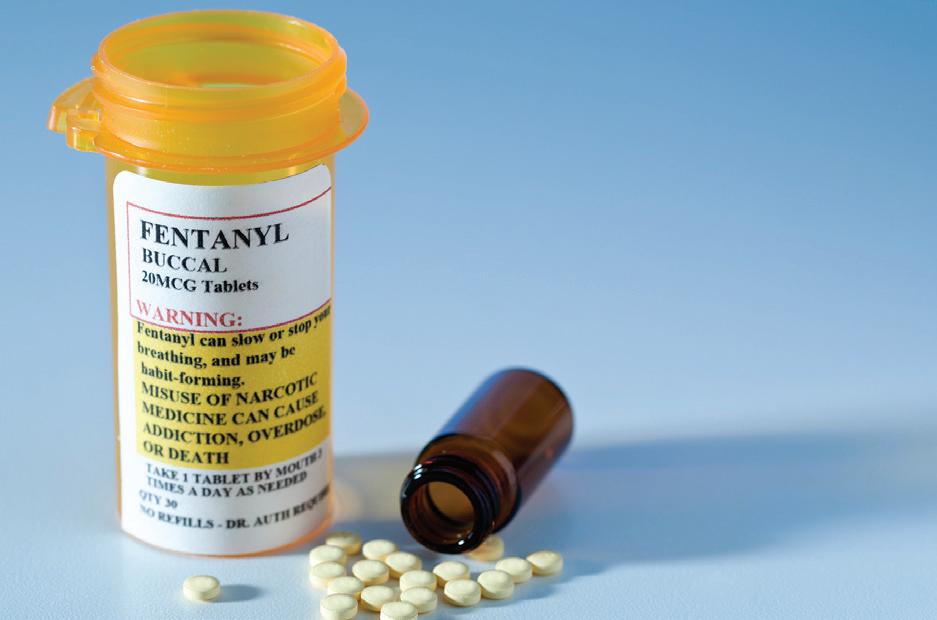
Hub and Spoke
Hub and Spoke is a gateway to connect clients to necessary healthcare within the Central Washington region and throughout our local communities. It utilizes key partnerships to expand access to medications to treat opioid use disorder (MOUD) for individuals struggling with opioid use disorder (OUD). This innovative approach places Comprehensive Healthcare at the center – or hub – of a diverse network of 15+ community-based service providers, known as spokes, to ensure that clients receive the individualized support and services they need to help them through treatment.
“It takes a village to fight the war on opioids,” said Marc Shellenberger, Hub and Spoke care manager, and 15-year veteran employee at Comprehensive Healthcare. “Our intention with this program is to come together as a network of specialized services to help people achieve their goals for recovery.”
Based on our clients’ needs, we have many options to refer clients to partners, such as specialized providers for substance use disorder treatment, mental health care, long-term care for a variety of different services such as housing and food resources, and primary medical care.
Comprehensive Healthcare qualifies as a hub because we offer a full spectrum of programs: we’re one of only two opioid treatment programs in Central Washington that also offers crisis triage, residential treatment for co-occurring mental health and SUD treatment, outpatient treatment, and a withdrawal management program.
In 2023, Comprehensive Healthcare continued to implement innovative new programs to support access to care – meeting our clients where they are with services for whole-person care. We’re bringing new facilities online and building partnerships that help us serve our communities. In response to the growing need for substance use disorder (SUD) treatment, the organization saw an increase in clients engaged in our SUD programs – including those seeking care for both mental health and SUD needs.
For another year in a row, we significantly increased the number of clients we served in Benton/Franklin counties. We’ve added new services in Columbia County.
Serving Children, Youth, Adults and Seniors
Number of clients served, by age
We serve a diverse population and are proud to incorporate culturally sensitive care where everyone can feel welcome and safe. Our goal is to ensure equal access to all our programs, without discrimination. Clients Served by County
Some of our clients receive services in more than one county.
In 2023, the number of clients seeking SUD services increased over 2022. Nearly 4,000 clients engaged a broader spectrum of Comprehensive Healthcare’s services for SUD and mental health needs.
Clients Served

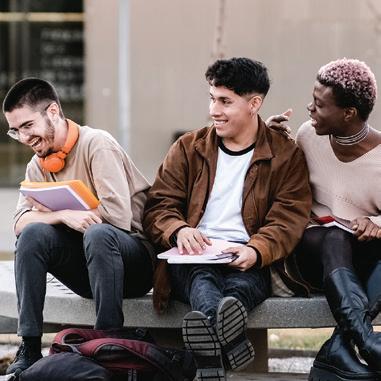



Great News in Behavioral Health!
Our region is at the cusp of significant change in behavioral healthcare as Comprehensive Healthcare is putting millions of dollars in federal and state funding to work for our community. Our goal is to meet our clients where they are by offering behavioral health and substance use treatment for mental health and wellbeing through accessible, timely and whole-person care.
We’ve been busy lately, and want to share our great news in behavioral health with you, our vibrant community.
$4 Million Federal Grant to Improve Access to Behavioral Healthcare in Yakima
We recently announced a $4 million four-year grant to expand our services in Yakima, and to make them more accessible to everyone regardless of people’s ability to pay. This grant from The Department of Health and Human Services Substance Abuse and Mental Health Services Administration (SAMHSA) will expand Certified Community Behavioral Health Clinic (CCBHC) services in our area by increasing access to primary health care, expediting substance use disorder (SUD) services to clients and local homeless populations experiencing drug addiction, as we implement staff training to serve marginalized people from diverse backgrounds. Senator Maria Cantwell’s office was instrumental in securing the funding.
One of the many positive outcomes of this funding is the new primary care Walk-In Clinic, now open and available to serve our clients’ medical needs on a walk-in basis with no appointment required.
Two healthcare providers offer primary care services to clients at the Walk-In Clinic at our Yakima Center. This helps us ensure timely, integrated physical care that complements our clients’ behavioral health treatments. This funding has also improved our local economy by providing multiple jobs in our community. We are recruiting for many positions listed at https://comphc.org/employment/ or they can be accessed through the QR code on the back of this magazine.
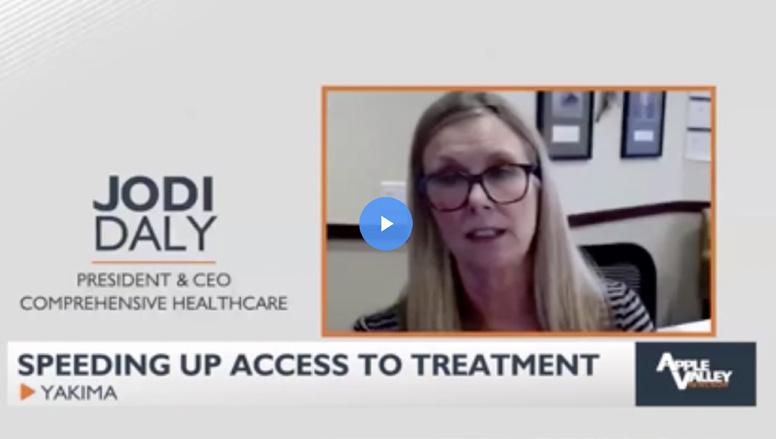
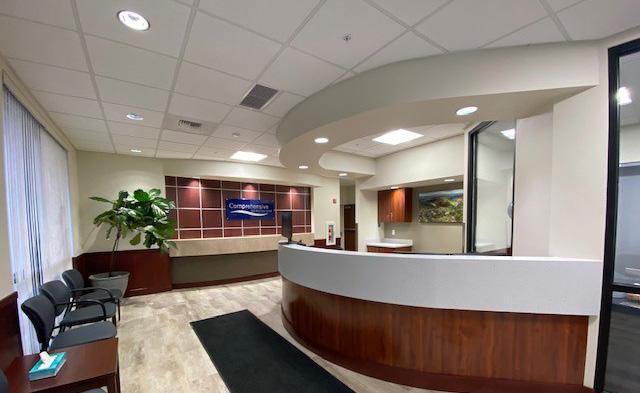
$2 Million Grant to Support the Behavioral Health Needs of Youth and Families in Walla Walla and Pasco
In 2023, we were awarded a $2 million Substance Abuse and Mental Health Services Administration (SAMHSA) Youth and Family TREE Grant to implement wraparound mental health services for families in the Walla Walla and Pasco communities. This is life-changing for youth and families and will expand services to the whole family unit, instead of just one member of the family. The grant will support employment and career counseling for transitional youth at risk for SUD and provide education on living a healthy lifestyle. With this financial support we continue to make services more accessible and impactful for the communities we serve. For more information on these and other transformative projects, visit our website at comphc.org and find us on Facebook and Instagram.
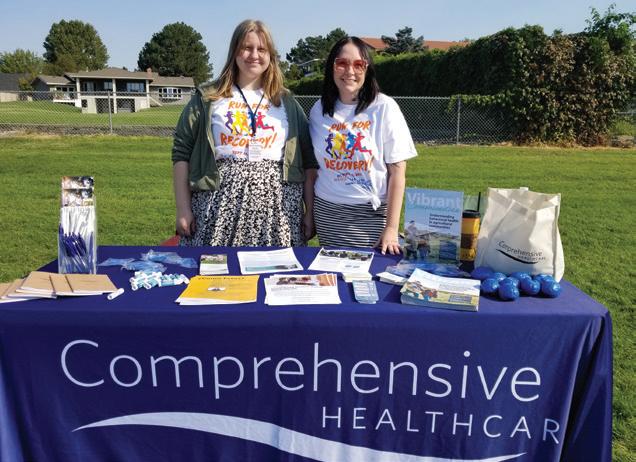
RUN FOR RECOVERY
In the fall, our Youth Mobile Outreach team members, Angela Wolford and Cori Nustad represented Comprehensive Healthcare at the Benton Franklin Recovery Coalition’s Third Annual 5K Run for Recovery along the Columbia River at Wade Park in Pasco.
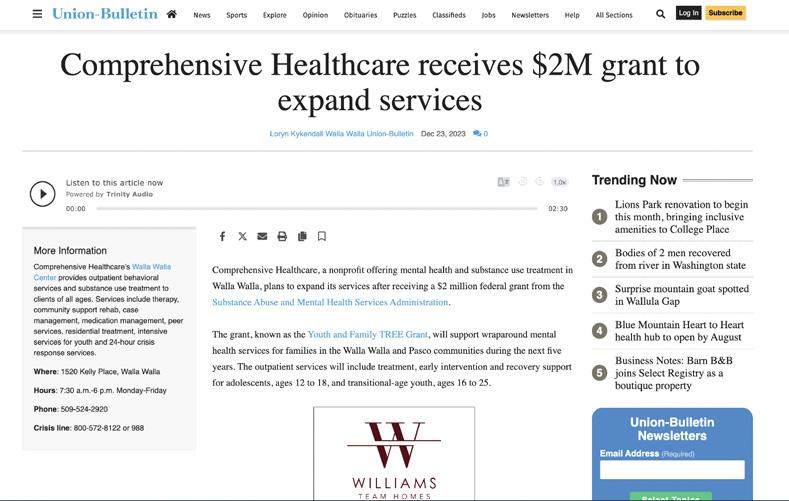
Out in the Community
Tuesday-Friday 8:30 a.m.-6:30 p.m. Saturday 9:00 a.m.-1:00 p.m.
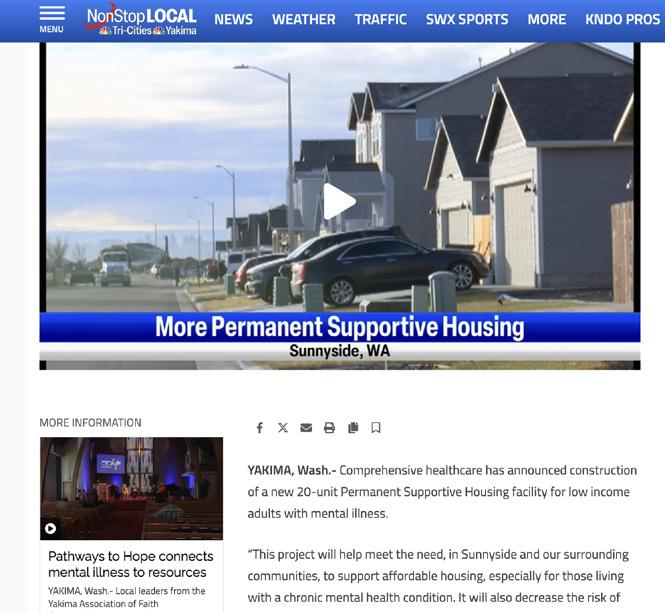
Expanded Permanent Supportive Housing Resources in the Lower Yakima Valley
In 2023, Comprehensive Healthcare received a $5 million Department of Commerce Housing Trust Fund Loan to build Vista Del Sol-2, a 20-unit permanent supportive housing facility in Sunnyside for low-income adults with a diagnosed chronic mental health condition expected to be of continual and indefinite duration. Adults living with these conditions can live independently and can improve with supportive housing.
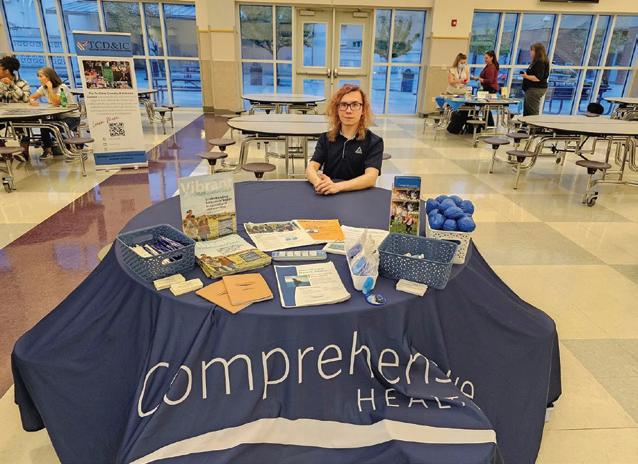
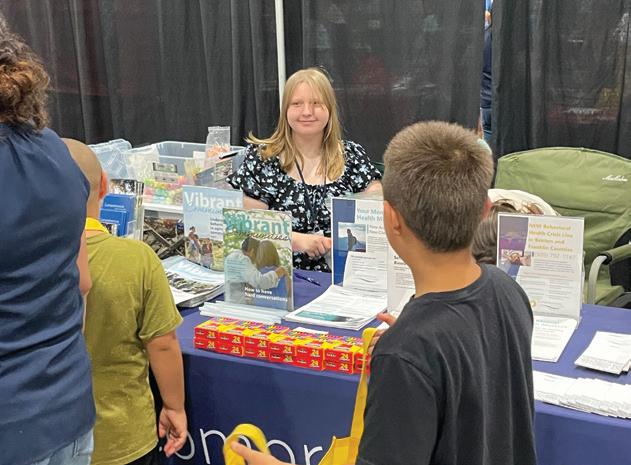
BACK TO SCHOOL
Our Youth Mobile Outreach team members, Angela Wolford and Glenn Siekawitch welcomed students at various back to school events at Pasco High School and the HAPO Center.
 Earlier this year, Apple Valley News interviewed our CEO, Jodi Daly, PhD. on our expanded services in Yakima.
Earlier this year, Apple Valley News interviewed our CEO, Jodi Daly, PhD. on our expanded services in Yakima.
Yakima Center
402 S. 4th Avenue
P.O. Box 959
Yakima, WA 98907
(509) 575-4084 comphc.org
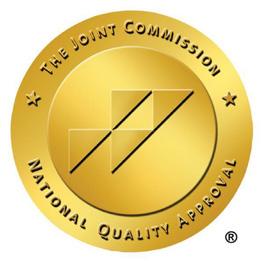
Ellensburg Center
707 N. Pearl Street
Ellensburg, WA 98926 (509) 925-9861
Cle Elum Center 402 1st Street Cle Elum, WA 98922 (509) 674-2340
Sunnyside Center 1319 Saul Road Sunnyside, WA 98944 (509) 837-2089
Pasco Center
2715 Saint Andrews Loop, Suite C Pasco, WA 99301 (509) 412-1051
Goldendale Center (509) 773-5801
Walla Walla Center 1520 Kelly Place, Suite 234 Walla Walla, WA 99362 (509) 524-2920
White Salmon Center (509) 493-3400
Kennewick Center 7404 West Hood Place Kennewick, WA 99336-6718 (509) 792-1747

We’re Hiring - Help Our Community
If you want to make a difference in our communities, we have roles for you!
We value our team members with competitive benefits including tuition reimbursement, holiday pay and student loan forgiveness. Our employees are team-minded, creative and compassionate individuals who enjoy being challenged and continually strive for excellence. We have a variety of openings from clinical and medical providers, to care coordinators, crisis outreach experts, and beyond. Click on the QR code to learn about job openings.
Why Work for Us
• Bonuses for eligible staff
• Tuition Reimbursement Program
• Student Loan Repayment Assistance
• Employee Assistance Plan
• Online, text-based primary health care –98point6
• Legal Service Plan
• Funded team-building activities
For employment opportunities with Comprehensive Healthcare visit https://comphc.org/employment/ or contact Megan Peters, Recruitment Specialist, (509) 576-4337, megan.peters@comphc.org
Link to open positions
